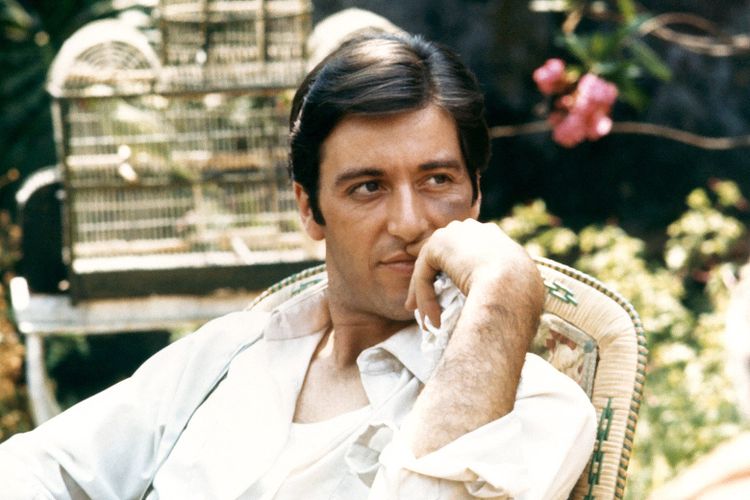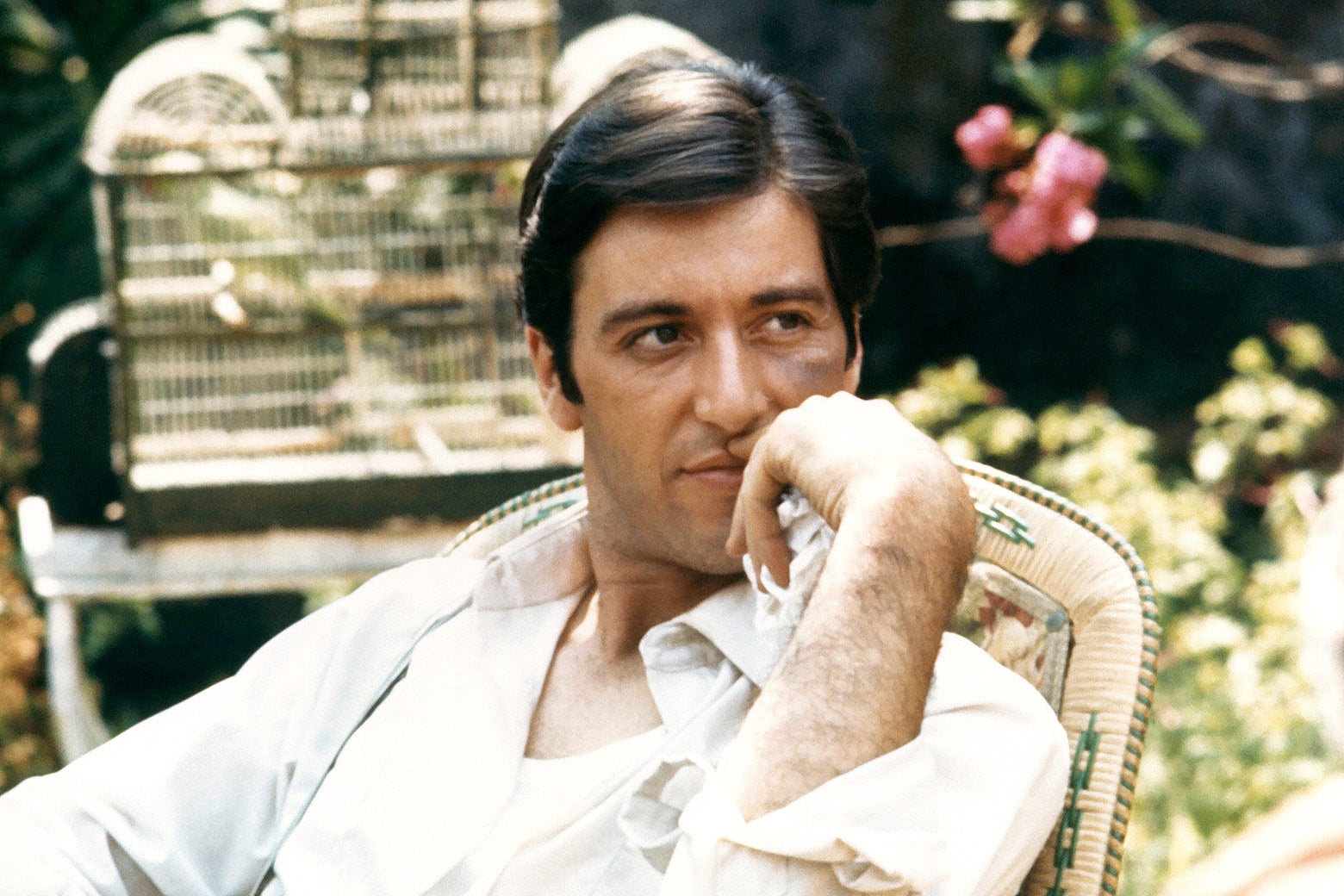One of Cinema’s Greatest Actors Is Also One of Its Weirdest. His Memoir Helped Me Understand Him.

Could Al Pacino's Church Make Me A Believer?
I have this friend—let's name her Celine—who is incredibly obsessed with Al Pacino. I’m not exaggerating when I say obsessed. She often shares random stickers of him in our group chats just because. At one point, she actually thought about purchasing a $400 poster featuring him. She can effortlessly recite his filmography without missing a beat. I've caught her on several occasions at birthday parties shouting lines from *Heat* at people. She genuinely plans to take a day off from work when he passes away.

I completely respect Celine's intense fascination with Al Pacino, but I’ve never quite understood it. I’ve watched The Godfather and Celine convinced me to check out Heat. I'll acknowledge that I appreciated Pacino's skill in delivering some of the craziest lines (the infamous “she's got a great ass” definitely sticks in my mind), but I still didn’t get the hype. He’s just an actor, after all.
When I learned that Al Pacino was publishing his first memoir this month, I realized it was a chance to delve deeper. What is it that makes him such a fascinating figure for so many? Why is he such a monumental presence in the world of cinema? Fortunately, I had the ideal person to help me explore this. When I asked Celine to read the book with me and help me embrace the Pacino fandom, she was incredibly enthusiastic. “I'm in tears, this is the best present ever—oh, I adore him so much,” she exclaimed.
Celine has seen more movies than anyone else I know, but her obsession with Pacino's acting is something new, she shared with me. While part of it is that she finds Pacino appealing, that's not the main factor. She turned to Al Pacino during a particularly chaotic and emotional period in her life. "It was comforting to see that kind of intensity mirrored on screen," she explained.
Before we got the book, Celine put together a Pacino triple feature for us: three films that captured the essence of his career, as much as could be conveyed in just three movies. We started with *Dog Day Afternoon*, and "intensity" truly is the perfect word to describe it. In his role as Sonny Wortzik, the aspiring bank robber, Pacino showcases these intense, expressive eyes that hint at an impending eruption long before it actually happens. And in a Pacino movie, it almost always does, Celine explains. "It can be a bit overwhelming—that's part of the charm," she noted. Except when it comes to *The Godfather*. "Perhaps *The Godfather* is so effective because the audience is aware of Pacino's capabilities, yet he restrains himself—the suggestion of chaos lingers." It's impressive how a man who's about 5-foot-6 can channel such an incredible amount of raw energy.
Next, we watched Cruising, which Celine mentioned presents him in a different light: softer and more subdued. We wrapped up with Jack and Jill, a film I didn't bother to research before we started it. Let me be honest—it's a terrible movie. This left me confused. Is this really your king? The same guy playing himself and rapping about "Dunkaccinos" alongside Adam Sandler dressed as his own sister? Celine looked at me and said, "You see, he approaches every role, even the bad ones, with complete seriousness. He always gives it his all—100%. You don’t see many contemporary actors doing what Pacino does. Maybe Robert Pattinson comes close—he’s very attractive and a heartthrob, but he consistently chooses offbeat roles."
Al Pacino's autobiography, Sonny Boy, starts at the very beginning: in the South Bronx. By all typical accounts, Al Pacino was not meant to become the star he is today. He grew up in a poor neighborhood and was on the verge of heading down a bad path when a teacher recognized his acting potential. As a child, he spent his time causing trouble on the streets alongside a trio of friends, all of whom ultimately lost their lives to heroin overdoses. Yet, even in those early days, Pacino felt he was destined for greatness. “Who was this kid, with this intense energy that could illuminate a schoolyard at night?” he reflects. He became a member of the renowned Actors Studio and experienced a fortunate break when he starred in an off-Broadway production in 1968 called The Indian Wants the Bronx, setting his career in motion.
This section offers ample evidence that Pacino was truly meant for the stage. His acting seems to come to him as if by some higher power—or perhaps it's more like a mischievous force that pushes him to take bold chances, with varying degrees of success. He admits, “I’m not above the occasional outburst of insanity. I am guilty of inconsistency and off-the-wall choices,” which brings to mind his memorable line delivery. For Pacino, if he’s not fully committed, he doesn't see the point. “When I work, I’m on the edge. I’m diving in, taking risks. I want to embrace those risks. I’m eager to soar and stumble. I want to collide with something in the process, because that’s how I feel truly alive.” His passion for his craft is paramount. Throughout the book, he frequently references Shakespeare. There was even a time when he became so immersed in his portrayal of Richard III that, after a performance, he sat there in a daze, extending his hand to Jackie Onassis for her to kiss.
This may come across as a bit self-serving and annoying, but Al Pacino is open about admitting when he has made mistakes. In the 2000s, his accountant mismanaged his finances, and Pacino's careless spending didn't help either. As a result, he had to accept roles in films like Jack and Jill just to make ends meet. During this period, he starred in a series of really poor movies, which he openly acknowledges he took on "just for the money." He stated, "I had an inkling they were bad, but I convinced myself I could somehow turn them into something decent."
As I read, I sensed that there’s something about Al Pacino that doesn’t quite come through on the page. He grapples with what draws people to him throughout his memoir. Pacino recognizes the gap between the everyday man who rises in the morning and strolls through Los Angeles and the iconic figure he’s become—a star that adorns many college students’ walls as Scarface, and an actor whose portrayal of Shylock in Shakespeare in the Park is still celebrated by both the industry and audiences. He recounts a moment when he picked up his 8-year-old daughter from school and she asked, “Dad, are you Al Pacino?” He answered, “Well, I’m both. I’m Dad and I’m Al Pacino. Can’t you see my two heads?” It seems natural for someone as well-known as Pacino to feel divided, caught between his public persona and his private life. However, he doesn't fully define either side, which is intriguingly refreshing. In one chapter, he shares, “As I write this book, I’m uncovering more about myself and starting to see a person who, in a sense, is quite rebellious.”
Once we both finished reading, I asked Celine if she thought the book captured what makes Pacino so captivating.
"No, I don't believe he understands the appeal of it himself."
Pacino views himself as a fortunate child rather than someone born with natural star quality. The intense charisma and vibrant energy he exudes truly come alive when he's performing, whether on screen or stage, and he struggles to explain it. When he tries to pinpoint this unique trait, he mentions a vague, unsettling restlessness he experiences, which is a challenging thing for anyone to articulate about themselves.
Slate earns a commission when you buy products through the links provided on this page. We appreciate your support!
"This is simply my nature, something that has always been a part of me. When I'm in a situation, my immediate thought is often, why am I here? It doesn't seem to matter what the context is, my instinct is to want to escape. I hesitate to leave, though, as I don’t want to offend anyone, so I end up staying. Yet, the urge to go remains strong." This contrast defines Pacino's approach: he pours himself fully into every character, but the restless energy that captivates audiences might stem from his longing to be somewhere else.
Celine expressed that it feels as if he could step right out of the screen at any time, which intensifies your fascination with his performances.
Watching Pacino on screen gives the impression that he possesses a vitality that surpasses those around him. The narrative of Sonny Boy offers hints about the source of this vibrant energy. As the narrator in Sonny Boy, Pacino expresses an unyielding passion for life; he genuinely enjoys being alive and seems genuinely surprised by his fortunate circumstances. Towards the conclusion of the book, he reflects with a hint of regret on his nostalgia for the neighborhoods from his youth and the colleagues he started out with. He recalls the saying, “You can’t look back,” but he insists, “I do look back, and I cherish those memories. I love what I remember. I’m grateful for having existed.” In another part, he remarks, “It astonishes me that these experiences really happened to me.” And it’s understandable why he feels that way. His journey could have turned out very differently. Instead of succumbing to a heroin overdose at just 24—a real possibility—he became the iconic Al Pacino. And now that he is Al Pacino, why not fully embrace every moment?
After going through this quick overview, I have to admit that I also appreciate his existence. Maybe not to the same extent as Celine, but I definitely do.

























































